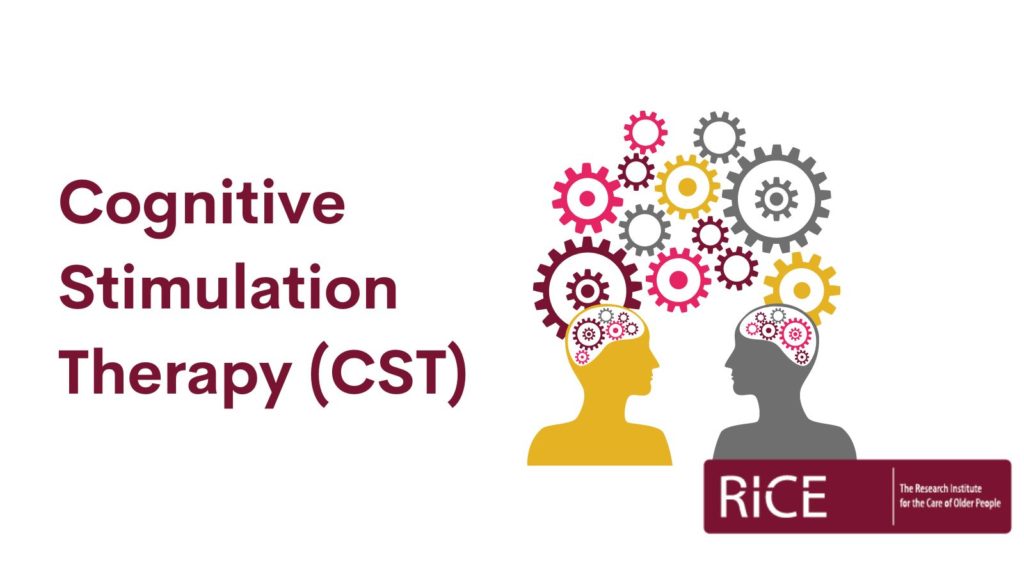
Cognitive Stimulation Therapy (CST) is a non-pharmacological intervention that aims to improve cognitive function and quality of life for individuals with dementia. It involves a range of activities that are designed to stimulate the brain and promote cognitive function. CST is a person-centered approach that is tailored to the individual's needs and interests, and it can be delivered in a group or one-to-one setting.
Research has shown that CST can be effective in improving cognitive function, mood, and quality of life for individuals with dementia[1] . One study found that CST was associated with significant improvements in cognition, with an overall effect size of 0.41[2] . Another study found that individuals who participated in CST had better cognitive function and quality of life than those who did not[3] .
Individual Cognitive Stimulation Therapy (iCST) is a one-to-one, carer-led psychosocial intervention that has been adapted from CST for individuals with dementia[2] . iCST is designed to be delivered by a family member or caregiver, and it involves a range of activities that are tailored to the individual's needs and interests.
CST can be delivered in a variety of settings, including care homes, hospitals, and community centers. It can also be delivered remotely, using technology such as video conferencing. CST can be delivered by a range of healthcare professionals, including occupational therapists, speech and language therapists, and dementia support workers.CST activities can include reminiscence therapy, cognitive games and puzzles, music therapy, and art therapy. These activities are designed to stimulate the brain and promote cognitive function, while also providing a sense of enjoyment and social interaction.
What are some examples of cognitive games and puzzles used in CST
Cognitive Stimulation Therapy (CST) includes a range of activities that are designed to stimulate the brain and promote cognitive function, while also providing a sense of enjoyment and social interaction. Some examples of activities used in CST include current affairs, word associations, money management, reminiscing about experiences, group discussions, and themed activities[1] [2] . CST provides guidelines for structuring small, theme-based group or individual sessions aimed at actively stimulating and engaging individuals with mild to moderate dementia[1] . The therapy also involves activities that target specific cognitive domains such as attention, working memory, language expression, and praxis[1] . Overall, CST activities are tailored to the individual's needs and interests and are designed to promote cognitive function, mood, and quality of life for individuals with dementia[3] .
What are the benefits of playing mobile brain games
Playing mobile brain games can have several benefits for cognitive function and mental health. These games can improve mood, train the brain, enhance wellbeing, and build social communities[1] [2] . Brain games can also improve specific cognitive skills, such as memory, attention, and processing speed[3] [4] . While the benefits of brain games are still debated, some studies have founded that brain-training games can improve executive functions, working memory, and processing speed[4] . Additionally, playing mobile brain games can be a fun and engaging way to promote cognitive function and improve mental agility. Overall, playing mobile brain games can have several benefits for cognitive function and mental health, and can be a convenient and enjoyable way to promote mental wellbeing.
Are there any negative effects of playing mobile brain games
While playing mobile brain games can have several benefits, there are also potential negative effects to consider. Excessive gaming can lead to lack of attention span, which can be particularly harmful for children[1] . Additionally, some studies have founded that violent video games can increase activity in the brain regions associated with arousal, anxiety, and emotional reaction[2] . Video games can also negatively affect the brain, memory, and a vision, and can cause stress[3] . However, it is important to note that the negative effects of mobile brain games are not well-established and may vary depending on the individual. Overall, while there are potential negative effects of playing mobile brain games, these effects are not well-established and should be balanced against the potential benefits of cognitive stimulation and mental agility.
Conclusion
In conclusion, Cognitive Stimulation Therapy (CST) is a promising intervention for people with dementia. It involves a set of tasks designed to reflect cognitive functions such as attention, memory, language, and problem-solving. The evidence suggests that CST can improve cognition and quality of life in people with dementia[1] [2] [3] [4] [5] .
CST is a widely used, evidence-based intervention that has been shown to have worthwhile benefits for many people with dementia. The results compare favorably with trials of drugs for dementia[5] . CST groups may have a significant impact on improving the cognitive abilities and quality of life of people with dementia.
Moreover, the impact of individual Cognitive Stimulation Therapy (iCST) on cognition, quality of life, caregiver health, and family relationships in dementia has been studied in a randomized controlled trial[5] . The study found that iCST had a positive impact on cognition, quality of life, and caregiver health.
Overall, CST is a promising intervention for people with dementia. It has been shown to improve cognition and quality of life in people with dementia. CST groups may have a significant impact on improving the cognitive abilities and quality of life of people with dementia. Further research is needed to determine the optimal frequency, duration, and intensity of CST for people with dementia.
.png)
No comments:
Post a Comment